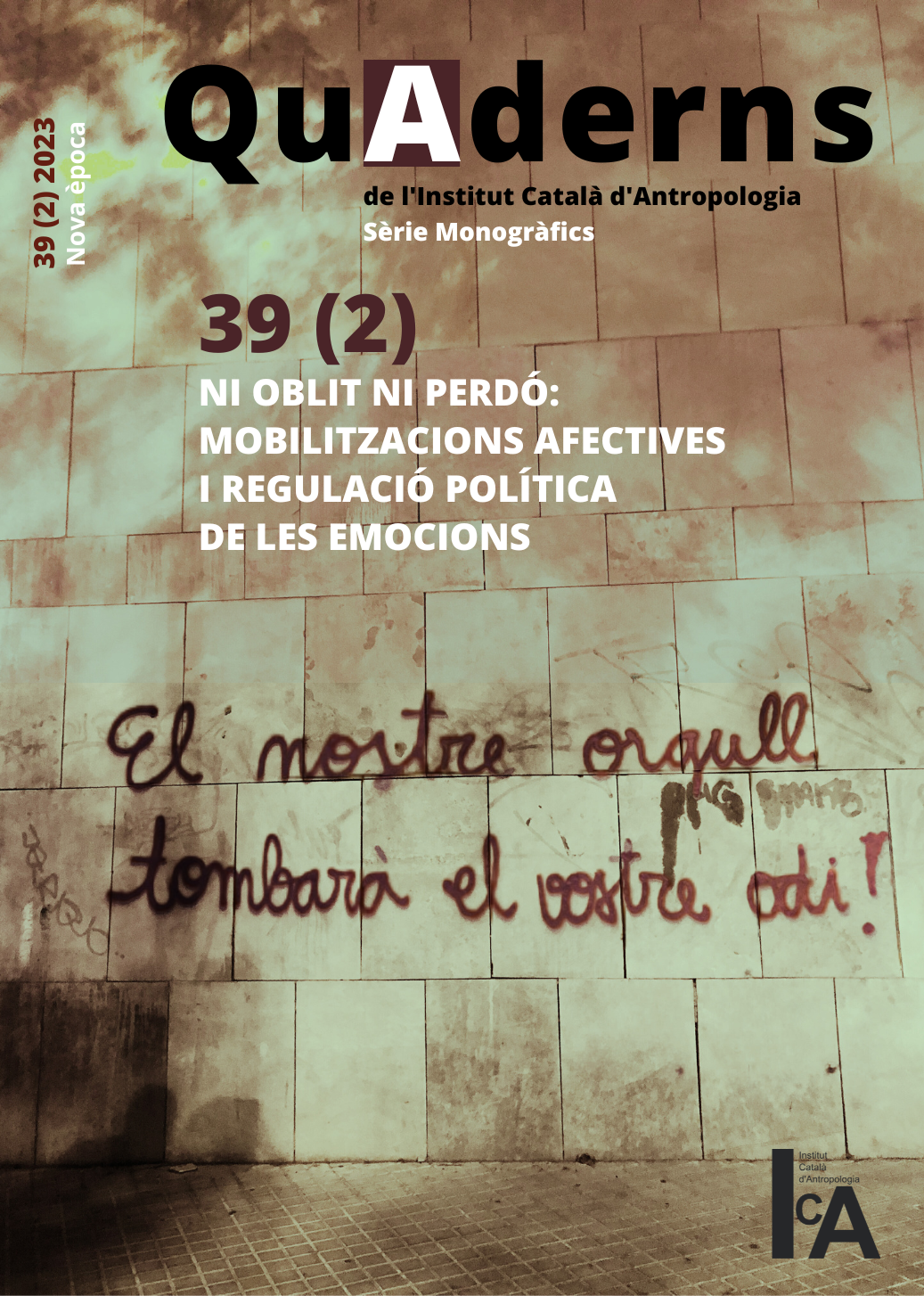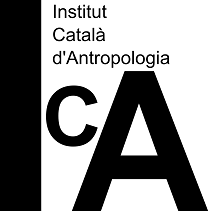"Qui sembra la misèria, recull la ràbia": el fluir de las emociones en el independentismo catalán actual
DOI:
https://doi.org/10.56247/qua.500Palabras clave:
Política, emociones, miedo, Catalunya, independentismoResumen
Este artículo se basa en una investigación realizada sobre la relación entre política y emociones en el movimiento independentista catalán. Propone situar las emociones como un campo de estudio imprescindible en relación con las políticas contemporáneas y profundizar en la Valencia emocional de la política y la Valencia política de las emociones para identificar qué emociones se activan con mayor frecuencia en este movimiento. Las emociones no se consideran como negativas o positivas o más o menos políticas, sino como ambivalentes, productivas políticamente y como un ensamblaje complejo. La investigación muestra cómo las emociones no aparecen aisladas sino en relación; sus relaciones cambian en función de la militancia, el momento político, el momento personal y la edad. El género afecta poco a la activación y configuración emocional, según los datos. En relación con el proceso independentista catalán, las emociones más destacadas por lxs participantes en la investigación son el miedo y a mucha distancia la rabia, el orgullo, la vergüenza, la felicidad y la ilusión. Entre las múltiples posibilidades existentes, se moviliza un repertorio bastante limitado de emociones, cuya activación máxima se produce en relación con momentos concretos identificados como momentos clave por lxs informantes.
Descargas
Estadísticas globales ℹ️
|
366
Visualizaciones
|
143
Descargas
|
|
509
Total
|
|
Citas
Åhäll, L. (2018). Affect as Methodology: Feminism and the Politics of Emotion. International Political Sociology, 12, 36–52. DOI: https://doi.org/10.1093/ips/olx024
Ahmed, S. (2004a). Affective economies. Social Text, 22(2), 117-139. https://doi.org/10.1215/01642472-22-2_79-117 DOI: https://doi.org/10.1215/01642472-22-2_79-117
Ahmed, S. (2004b). Collective feelings: Or, the impressions left by others. Theory, Culture & Society, 21(2), 25-42. https://doi.org/10.1177/0263276404042133 DOI: https://doi.org/10.1177/0263276404042133
Ahmed, S. (2017). La política cultural de las emociones. Ciudad de México: Universidad Nacional Autónoma de México.
Anderson, B. (2009). Affective atmospheres. Emotion, Space and Society, 2(2), 77-81. https://doi.org/10.1016/j.emospa.2009.08.005 DOI: https://doi.org/10.1016/j.emospa.2009.08.005
Barad, K. (2007). Meeting the universe halfway: Quantum physics and the entanglement of matter and meaning. Durham: Duke University Press. DOI: https://doi.org/10.2307/j.ctv12101zq
Bargetz, B. (2014). Mapping affect. Challenges of (Un)timely Politics. En M.-L. Angerer, B. Bösel, & M. Ott (Eds.), Timing of Affect. Epistemologies, Aesthetics, Politics (pp. 289-302). Zurich: Diaphanes AG.
Bargetz, B. (2015). The distribution of emotions: Affective politics of emancipation. Hypatia, 30(3), 580-596. https://doi.org/10.1111/hypa.12159 DOI: https://doi.org/10.1111/hypa.12159
Bargetz, B. (2020). The sentimental contract: Ambivalences of affective politics and publics. En A. Fleig & C. von Scheve (Eds.), Public Spheres of Resonance: Constellations of Affect and Language (pp. 63-80). London: Routledge. DOI: https://doi.org/10.4324/9780429466533-6
Braidotti, R. (1991). Patterns of Dissonance: A Study of Women and Contemporary Philosophy. Cambridge: Polity Press.
Camps, C., Moreno, A., & Almeda, E. (2021). Autodeterminación y represión política en Catalunya. Referéndum, excepcionalidad penal y democratización. Derechos en Acción, 6(19), 639-677. DOI: https://doi.org/10.24215/25251678e528
Cervio, A. L., Lisdero, P., & D’hers, V. (2020). “Cuerpos precarios”: Habitar, respirar y trabajar en el sur global. Una mirada desde la sociología de los cuerpos/emociones. Empiria. Revista de metodología de ciencias sociales, 43-63. DOI: https://doi.org/10.5944/empiria.47.2020.27424
Closs Stephens, A. (2016). The affective atmospheres of nationalism. Cultural Geographies, 23, 181-198. https://doi.org/10.1177/1474474015569994 DOI: https://doi.org/10.1177/1474474015569994
Clough, P. T., & Halley, J. (2007). The affective turn. Theorizing the social. Durham: Duke University Press. DOI: https://doi.org/10.2307/j.ctv11316pw
Collier, M. (2001). Approaches to analysis in visual anthropology. En T. van Leeuwen & C. Jewitt (Eds.), Handbook of visual analysis (pp. 35-65). Londres: Sage. DOI: https://doi.org/10.4135/9780857020062.n3
De Sena, A. (Ed.). (2014). Las políticas hechas cuerpo y lo social devenido emoción: lecturas sociológicas de las políticas sociales. Buenos Aires: Estudios Sociológicos Editora.
DeLanda, M. (2006). A new philosophy of society: Assemblage theory and social complexity. Londres: Continuum.
Deleuze, G., & Guattari, F. (1987). A thousand plateaus: Capitalism and schizophrenia. Minneapolis: University of Minnesota Press.
Demertzis, N. (2013). Introduction: Theorizing the Emotions-Politics Nexus. En N. Demertzis (Ed.), Emotions in Politics (pp. 1-16). Londres: Palgrave Macmillan UK. DOI: https://doi.org/10.1057/9781137025661_1
Flam, H. (2005). Emotions’ map. A research agenda. En H. Flam & D. King (Eds.), Emotions and Social Movements (pp. 19-40). Nueva York: Routledge.
Goodwin, J., Jasper, J., & Polletta, F. (2000). The return of the repressed: The fall and rise of emotions in social movement theory. Mobilization: An International Quarterly, 5(1), 65-84. https://doi.org/10.17813/maiq.5.1.74u39102m107g748 DOI: https://doi.org/10.17813/maiq.5.1.74u39102m107g748
Hemmings, C. (2005). Invoking Affect: Cultural Theory and the Ontological Turn. Cultural Studies, 19(5), 548–567. DOI: https://doi.org/10.1080/09502380500365473
Hemmings, C. (2012). Affective solidarity: Feminist reflexivity and political transformation. Feminist Theory, 13(2), 147-161. DOI: https://doi.org/10.1177/1464700112442643
ICPS. (2020). Sondeig d’opinió de Catalunya. Institut de Ciències Polítiques i Socials (adscript UAB).
Jasper, J. M., & Owens, L. (2014). Social movements and emotions. En J. E. Stets & J. H. Turner (Eds.), Handbook of the Sociology of Emotions: Volume II (pp. 529-548). Dordrecht: Springer. https://doi.org/10.1007/978-94-017-9130-4_25 DOI: https://doi.org/10.1007/978-94-017-9130-4_25
Kenway, J., & Fahey, J. (2011). Public pedagogies and global emoscapes. Pedagogies: An International Journal, 6(2), 167-179. https://doi.org/10.1080/1554480X.2011.554626 DOI: https://doi.org/10.1080/1554480X.2011.554626
Lépinard, É., & Quéré, L. (2021). Introduction to special issue. European Journal of Women’s Studies, 28(3), 299-304. DOI: https://doi.org/10.1177/13505068211028443
Liljeström, M. (2016). Affect. En L. Disch & M. Hawkesworth (Eds.), The Oxford Handbook of Feminist Theory (pp. 16-38). Oxford, UK; New York, NY: Oxford University Press. DOI: https://doi.org/10.1093/oxfordhb/9780199328581.013.3
Líndez Borràs, M. C. (2013). Movilización en la sociedad catalana: Aparición y pervivencia. Clivatge, 2, 88-116.
Lorde, A. (1981). The uses of anger. Women’s Studies Quarterly, 9(3), 7-10.
Martí Pérez, J. (2022). Proximidades teóricas posthumanistas y conocimiento antropológico. En Martí, J. y Enguix, B. (Eds.) (2022) Pensar la antropología en clave posthumanista, (pp. 31-60). Madrid: CSIC-Biblioteca de Antropología.
Mata Mardegáin, A. (2020). Análisis de la situación político-social en la Comunidad Autónoma de Catalunya, a partir del Referéndum de Autodeterminación de 2017. Muuch’ xíimbal Caminemos juntos, 11, 149-164.
Poma, A., & Gravante, T. (2017). Emociones, protesta y acción colectiva: Estado del arte y avances. Aposta. Revista de Ciencias Sociales, 74, 32-62.
Puig de la Bellacasa, M. (2009). Touching technologies, touching visions: The reclaim of sensorial experience and the politics of speculative thinking. Subjectivity, 28, 297-315. https://doi.org/10.1057/sub.2009.17 DOI: https://doi.org/10.1057/sub.2009.17
Real Instituto Elcano. (2019). El conflicto independentista en Catalunya. Madrid: Real Instituto Elcano. Recuperado de:https://www.realinstitutoelcano.org/wp-content/uploads/2021/11/cataluna-dossier-elcano-octubre-2019.pdf (consultado en diciembre de 2022).
Ruiz-Junco, N. (2013). Feeling Social Movements: Theoretical Contributions to Social Movement Research on Emotions. Sociology Compass, 7(1), 45–54. doi: 10.1111/soc4.12006 DOI: https://doi.org/10.1111/soc4.12006
Sauer, B. (2019). Mobilizing shame and disgust: Abolitionist affective frames in Austrian and German anti-sex-work movements. Journal of Political Power, 12(3), 319-338. https://doi.org/10.1080/2158379X.2019.1669262 DOI: https://doi.org/10.1080/2158379X.2019.1669262
Sauer, B. (2020). Authoritarian right-wing populism as masculinist identity politics. The role of affects. En G. Dietze & J. Roth (Eds.), Right-Wing Populism and Gender (pp. 23-40). Berlin: Transcript Verlag. https://doi.org/10.1515/9783839449806-002 DOI: https://doi.org/10.1515/9783839449806-002
Schadler, C. (2019). Enactments of a new materialist ethnography: Methodological framework and research processes. Qualitative Research, 19(2), 215-230. https://doi.org/10.1177/1468794117748877 DOI: https://doi.org/10.1177/1468794117748877
Scribano, A. (2017). Amor y acción colectiva: Una mirada desde las prácticas intersticiales en Argentina. Aposta: Revista de Ciencias Sociales, 74, 241-280.
Serrat, J. (2019). Vots al carrer l’1 d’octubre de 2017 a Catalunya: la ‘fake news’ menys aclarida. Trípodos, 44, 153-168. DOI: https://doi.org/10.51698/tripodos.2019.44p153-168
Subirats, J., & Vilaregut, R. (2012). El debat sobre la independència a Catalunya. Causes, implicacions i reptes de futur. Anuari del Conflicte Social, 2, 514-527.
Van Ness, J., & Summers-Effler, E. (2018). Emotions in social movements. En D. A. Snow, S. A. Soule, H. Kriesi, & H. J. McCammon (Eds.), The Wiley Blackwell companion to social movements (pp. 411-428). Nueva York: John Wiley & Sons. DOI: https://doi.org/10.1002/9781119168577.ch23
Vilaregut, R. (2011). Memòria i emergència en l’independentisme català. El cas de la Plataforma pel Dret de Decidir (Tesis Doctoral). Universitat Autònoma Barcelona, Bellaterra, Barcelona.
Wetherell, M. (2015). Trends in the Turn of Affect. Body & Society, 21(2), 139-166. doi:10.1177/1357034X14539020 DOI: https://doi.org/10.1177/1357034X14539020
Descargas
Publicado
Cómo citar
Número
Sección
Licencia
Distribuït sota els termes de la llicència d’ús i distribució Creative Commons Reconeixement 4.0 Internacional (CC BY-NC-SA 4.0)




